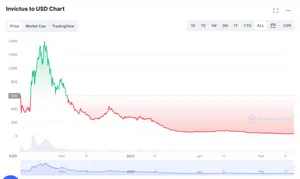However, although the project enjoyed a spike in price in November, the token has bled value since then. On March 9, the project leaders began a conversation about team salaries, where they also floated the idea of redeeming the treasury and closing the project. On March 11 they began a vote, which lasted only three days, and allowed members of the DAO to vote on whether the project should close and distribute treasury funds to participants. Much like the Wonderland vote in late January, a relatively small number of whales with a large share of the votes (who bought in early and still stood to make money on the project) were able to pass the vote to close the project, despite a majority of voters selecting to keep the project going. Furthermore, because the Invictus tokens used for voting also themselves hold the value, some people were unable to vote in the poll because their tokens were locked up in lending platforms where they had used them as collateral. Many participants in the project who haven't been actively watching the governance page likely don't even know the vote happened.
Some members of the project wrote on Discord that they felt rugged, with one even speculating that the project had been so eager to implement voting so they could pass a "community" vote to close the project and make off with a profit without damaging their reputations or potentially facing lawsuits. Various members of the project Discord shared how much they had lost: one person said they were down $20,000, another was down $75,000, and a third person reported losing $400,000. One person asked "who else is in the 6 figure loss club" and received three agreement emoji reactions; another person said they'd lost a year's salary. Some people already opted to try to sell their tokens early, worrying that the project leaders might make off with the treasury and not allow people to redeem their $IN; others waited in hopes of the redemption price being higher than the current token price; and some even suggested buying more $IN in hopes that they could make a profit if the redemption price is higher than the current price.










